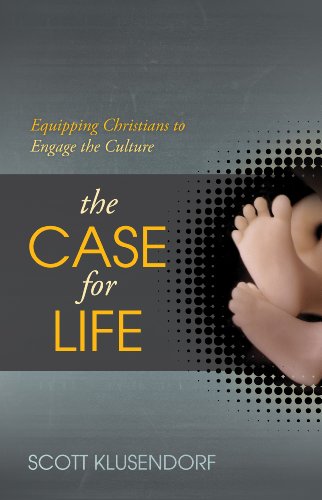John Fuller: This is Focus on the Family and your host Focus president Jim Daly. I’m John Fuller and today on our broadcast Scott Klusendorf challenges the thinking of some individuals who have a conflicted worldview about when life begins.
Excerpt:
Mr. Scott Klusendorf: They haven’t answered the question, what is the unborn? That’s where the whole debate starts. They assume the unborn are not human. And they don’t argue for it. They just assume it.
End of Excerpt
John: Scott is a very popular guest here on Focus on the Family and we recorded an interview with him in Chicago, Illinois, late last year and, Jim, we had a really enthusiastic crowd with us.
Jim Daly: They were really a lively group, John, and they were with us. And I think, obviously, they support a pro-life perspective. It was both fun and a serious time together as people came to take a stand for every heartbeat, including mothers and their pre-born babies. We sat down with Scott to help educate, equip and inspire people in the pro-life movement. And this is all leading up to our big online event September 26th that we’re calling See Life 2020. And we’ll have incredible speakers, great music, and a live 4D ultrasound. And we’ll give more details at the close.
John: You if you can’t wait, stop by our website…
Jim: That’s right.
John: …For details about See Life 2020. That’s at focusonthefamily.com/broadcast. Well, our guest, Scott Klusendorf, is the founder and president of Life Training Institute. He’s the author of the book, The Case for Life, and he’s spoken to and trained thousands of people to engage in positive, compelling conversations about the value of life. And you’ll often find him talking to college students or participating in a debate. He defends the pre-born child with Biblical, convincing, really effective arguments. And here now is the conversation we had with him.
Jim: Scott, it is good to have you back at Focus on the Family. Welcome.
Scott: Good to be in Chicago, Jim and John.
Jim: Now, is this your home area? Where – where are you from?
Scott: Actually, I was born in Detroit, so you’ll have to forgive me for that.
Jim: Oh! Is that okay, everybody?
Scott: And then lived in Los Angeles from age 2 to age 44, which means I’m a diehard Lakers and Dodgers and UCLA fan. You’ll have to forgive me for that. But it’s great to be back in Chicago, where my dad grew up.
Jim: (Laughter) That’s good.
John: There is a connection.
Jim: My dad grew up here.
Scott: Really?
Jim: Yeah, did your dad grow up here?
John: No, but I was born here. Does that count?
(LAUGHTER)
Jim: Well, that’s good. We’re all connected via Chicago.
Scott: Yeah.
Jim: How is this possible?
(CHEERING)
Jim: Yeah. All right, Scott, I want to get into this. Because you are bringing kind of the thoughtful way to engage a pro-abortion person. I am so looking forward to this, so we can help equip people to have those great discussions.
Scott: Yeah.
Jim: And one of the things – and here’s where I want to start, Scott. So often, we’re afraid to talk about what it is we believe…
Scott: Mm hmm.
Jim: …Because now in this culture, you can be shamed pretty well. I mean, we felt that in New York. We were – you know, there was hostility coming at us, because we were simply literally standing in Times Square saying, you know, “We think a baby’s life is important…”
Scott: Right.
Jim: “…And a precious thing to preserve.” And we believe in women who were in a very tough spot. But can’t we do better as a culture…
Scott: Yeah.
Jim: …Than kill the baby? I mean, seriously, we’re living in the 21st century.
Scott: Yeah, and there’s a reason why this debate is so divisive right now. And all of us need to be aware that the abortion debate is not about a surgical procedure. It’s not about choice and who decides. It’s not about trusting women. It’s not about forcing one’s morality. It’s about one question that is dividing our nation right now. And this question is why you see states like Illinois, New York, Connecticut and Vermont running away from any protection for unborn children and states like Georgia, Ohio, Missouri and other states passing laws to protect them. Here’s the question we are divided over. Who counts as one of us? And every one of us, Jim, have to know how to step up and make the case that the unborn count as one of us. And we’re following the command of Scripture, 1 Peter 3:15, to always be ready to give an answer for the hope that lies within us. We’re to do that graciously, but persuasively.
Jim: Uh, Scott, let me ask that question about, um, how you engage people? Because it’s hard. What is – how do you gear up for that and not psych yourself out to say, “Okay, I’m just not going to do it”?
Scott: Right.
Jim: When the relative at the holiday time, Thanksgiving and Christmas, when they want to talk about it, they keep goading you.
Scott: Right.
Jim: I mean, sometimes we just retreat to the football game.
Scott: Yeah, yeah. It’s really easy to take on too much responsibility here. We think that we have to close the deal on the spot as if we’re a car salesman. And in reality, as Christian apologists, our job is not to close the deal. That’s God’s job. Our job is to do what my colleague Greg Koukl says, “Put a pebble in their shoe.” You ever been out hiking and had a pebble in your shoe?
Jim: Yeah, it’s annoying.
John: (Laughter) Really annoying.
Scott: Yeah, it wears on you and wears on you until you deal with it. So, our job as Christian pro-life apologists, what we’re to do is to give people something to think about, put that pebble in their shoe that will wear on them and wear on them. And I’m reminded of the great debater William Rusher who wrote a book called, How to Win Arguments More Often Than Not. And Rusher said, “Arguments are almost never won on the spot. They’re won two or three weeks later when the person is alone with his or her thoughts and they admit you had the better of it.” And I think those of us who are married know this. When we have arguments with our spouse, do we slap ourselves on the knee and say, “Honey, I’m so glad Jesus put you in my life to straighten out my twisted thinking”? Is that what we do? No…
Jim: Yes.
Scott: …Well, OK, well, you’re a better man than me.
Jim: (Laughter) No. You learn over time.
Scott: Right, right. I think what typically happens is there’s a day and a half of passive-aggressive silence in the house…
Jim: (Laughter).
Scott: …While they work this through, you know? And then we kind of come to a consensus. But the people we talk to are no different. And we can take on this burden that says, “If I don’t somehow convert them on the spot, I failed.” No, your job as a Christian is to put that pebble in their shoe. And that’s how I avoid getting worked up, angry, uptight. And I just relax and say, “If I can find a few things to say that will give them something to think about, I can get the ball rolling.”
Jim: Let me punch that, because it’s important I think to put an emphasis on this. When you get angry and upset and aggressive, you’ve lost.
Scott: You’ve lost.
Jim: So, how do you pull back?
Scott: Yeah.
Jim: I mean, what if you’re that kind of person that those things trigger you? What can you do to say, “Wait a minute…”
Scott: Yeah.
Jim: “…Let me take a breather”? What do you say?
Scott: Well, what I do…
Jim: Or do?
Scott: What I do is I prepare a lot. `There’s the old saying, “The more you sweat in training, the less you bleed in battle.” And the more you’re confident of what you believe and you’re assured that it’s right, because you’ve done some reading – and you don’t have to read every book on the planet, but there are a few things you can use to study up and be prepared as a Christian apologist. And you tend to relax in those situations because you’ve heard this before…
Jim: Right. That’s good.
Scott: …You’re prepared for it, and you’re not caught off guard.
Jim: You’re calmer…
Scott: Yeah, you’re a lot calmer.
Jim: …Because you’re not trying to win.
Scott: Yeah.
Jim: You’re just presenting the facts. All right. You’re not born with this idea about life. So how – how did you come to the conclusion? What were you doing? What did you hear or see that made you so committed to the pro-life movement?
Scott: I had been pro-life all – as long as I can remember, Jim. But I wasn’t doing anything about it. I was attitudinally pro-life but not behaviorally pro-life. I was not lifting a finger to stop the killing. And a local crisis pregnancy center director befriended me when I was a pastor, an associate minister, at a church in Southern California, and she wouldn’t go away. She just kept bugging me and bugging me.
Jim: Sounds like a pebble.
John: A pebble in the shoe.
(LAUGHTER)
Scott: Yeah, yeah, pebble in the shoe. More like a boulder in my head.
Jim: (Laughter).
Scott: But anyway, she kept after me. And Lois, bless her heart, said to me, “Hey, we’re going to have a speaker who’s going to give a case for the pro-life view, and he’s a former member of the Pennsylvania House of Representatives. He was in the Reagan administration, and he knows law. And you will like this guy.” And I thought, okay, a bunch of our pastors will be there. We’ll have a bunch of pastors there. It was me, four other pastors and their wives. That was it…
Jim: Oh, man.
Scott: …When the topic was abortion. But that speaker, Gregg Cunningham, thankfully, who was not deterred by the small crowd, gave a compelling case for the pro-life view. And then he did something, Jim, that fundamentally changed me forever. He showed a brief video depicting abortion. I had never seen abortion. And I sat there, and I wept. And I thought, “I am no different than the priest and the Levite who passed by on the other side of the road. I say I care about this, but I’m not doing anything.” So, I went home that day, showed that VHS tape to my wife. VHS tapes were these rectangular things that were about like this.
(LAUGHTER)
Scott: And, um, I said, “Honey…”
Jim: Kids – you catch that, kids? No.
Scott: Yeah, yeah, I said, “Honey, I think my whole life has been changed.” And she said, “Whatever the Lord has for you, I’m with you.” So, that was 30 years ago, and here I am.
Jim: Man, that is so good. Um, yeah, give him a hand.
(APPLAUSE)
Jim: That’s where it starts. Give us kind of the national picture of abortion today. We’re hearing lots of different numbers. Abortions are down. Of course, you have the morning-after pill. That use is up. So, where is the nature of abortion in America today?
Scott: We are a house divided, to borrow a term from Lincoln, because you have states, like I mentioned earlier, that are rushing to pass pro-life legislation, and you have states running the exact opposite way. And the reason that’s happening now is the federal courts are signaling – we don’t know for sure, but they’re signaling that they may give states more leeway to legislate on the issue. What happened in Roe v. Wade is that the federal courts said to the other two branches of government – the executive branch and the legislative branch – you have no say in this issue; we alone will determine abortion policy. That’s what happened in Roe v. Wade and Doe v. Bolton. Well, now there’s an indicator that maybe they’re going to return some of this back to the states. I don’t know what that will look like.
If that happens, men and women, all of us have to step up and become apologists, because now we have an opportunity to persuade our fellow citizens in ways that we didn’t before. What I see culturally is, a group of people – young people, in particular – that have pro-life sentiment, but they don’t have a pro-life worldview. And here’s what I mean by that: They don’t like abortion, because they think it’s mean, but they also think it’s mean to tell someone they can’t marry their canary if they want to. They also think it’s mean to tell a woman that there shouldn’t be legalized abortion. They think it’s mean to tell her what she can and can’t do with her body. And therefore, though there’s this pro-life sentiment, there isn’t necessarily a pro-life worldview. We have our work cut out for us.
Jim: No, it’s true. I think there was a Barna poll not long ago that showed that 53% of millennials feel abortion, in almost every case, is immoral.
Scott: Yeah. Yeah. And when you ask them about it, you get very conflicting answers. If you say, “Well, do you think abortion’s a good thing?” “Well, no.” “Do you think it’s a good thing to have laws protecting the unborn?” “Well no, because we like choice.” And you get this conflicted worldview. And the reason for that is they haven’t answered the question, what is the unborn?
Jim: Yeah.
Scott: That’s where the whole debate starts. They assume the unborn are not human. And they don’t argue for it. They just assume it.
John: Well, that is an excellent point as always by Scott Klusendorf who believes it’s only fair that those who advocate for abortion should be required to scientifically defend and explain their position. Scott was our featured guest in Chicago last year at a Focus on the Family event held to really inspire and motivate people to support pre-born babies and their moms. And it was a way to also promote our online event coming up September 26th called See Life 2020. You can learn about See Life 2020 and get a copy of Scott’s book, The Case for Life, when you stop by focusonthefamily.com/broadcast. Let’s go ahead and rejoin the conversation now in front of a really engaged audience. Uh, here’s Jim Daly.
Jim: Zeroing in on Illinois and here in Chicago…
Scott: Yeah.
Jim: …It’s something we at Focus on the Family have worked with the pregnancy resource centers in this Chicagoland area to try to reduce abortion by 60,000 babies saved. That’s the goal.
Scott: Yeah.
Jim: We were able to raise the $1.9 million to embark on that program in a short period of time. The hearts and the people in this area responded so beautifully. And we’re in the midst of that now…
Scott: Right.
Jim: Over the next five years to save 60,000 children here in the Chicagoland area.
(APPLAUSE)
Scott: Yeah. That’s good. That’s good. Yeah.
Jim: Yeah. But one of the reasons that it caught our attention is that here in Illinois, abortion laws have become more liberal, while states surrounding Illinois become more restrictive.
Scott: Right.
Jim: And so, women – there’s been, like, a 40, 50% increase in out-of-state women coming into Chicago…
Scott: Right.
Jim: …To get an abortion. And in that context, speak to that kind of split in the states. You’ve touched on it. There’s eight states that have passed heartbeat bills. Now, let me – actually, let me get your response to this because this – I come out of the business world. I worked for a Fortune 500 company. And there were 187 companies that pledged to boycott Georgia…
Scott: Yeah.
Jim: …Because they were moving to a heartbeat bill.
Scott: Right.
Jim: Now, take my Christian hat off just for a minute. If I’m in a – in a boardroom of a Fortune 500 company and I’m thinking or proposing, let’s eliminate 60 million customers from our base, any chairman of that board’s gonna go, “You’re insane. You’re…”
Scott: Yeah.
Jim: “…No longer a board member.” But we had Disney as one of those 87 companies boycotting Georgia, because they wanted to implement the heartbeat bill.
Scott: Right.
Jim: Their – their customers are, like, two, three years away, right? Is that insane to anybody else but me?
Scott: Yeah.
Jim: I mean, that’s crazy.
Scott: It is. But what it reflects, Jim, is this worldview divide we have that is deeply fundamental over who counts as one of us. And that’s why the opposition is so stiff. Oh, by the way, I must say, as a resident of Georgia, it was nice to hear our governor say, “Given a choice between pleasing the movie industry and saving kids, we’re going to go with the kids.” And he signed the bill.
Jim: Yeah.
Scott: So, uh…
Jim: That is sanity.
(APPLAUSE)
Scott: Yeah. Yeah.
Jim: I mean, that’s sanity.
Scott: Yeah.
Jim: So, I mean, I just think it’s amazing that you – they – you can’t even rationalize with some of these leaders.
Scott: Yeah.
Jim: It seems so bizarre. How much money would Disney have made off 60 million babies…
Scott: That’s right.
Jim: …Who were aborted?
Scott: That’s right.
Jim: I’m sorry, but just think about it.
Scott: Yeah. Yeah.
Jim: I mean, it’s crazy. Scott, let’s get into SLED, because I want to make sure that, tonight, the – the folks here and the millions listening really get a handle on how to use this acronym SLED that you created and apply in these discussions. So, take us through it. What is SLED?
Scott: Well, here’s the defense of the pro-life position very briefly. We argue from science that the unborn are distinct, living and whole human beings. But then we argue philosophically that there’s no essential difference between Jim, the embryo, and Jim, the adult, that would justify killing you at that earlier stage of development. Differences of size, level of development, environment – meaning where you’re located – and degree of dependency are not good reasons for saying we could kill Jim as an embryo but not kill him as an adult. So, if you look at those four categories, size – there’s your S – you were smaller as an embryo. So, by the way, – just – I’m going to preach for a moment.
John: Do it.
Scott: Christians need to stop taking the burden of proof every time a critic raises an objection. Typically, someone says, “Well, that embryo is small.” And our pro-life responses is, “Well, but he’s going to grow big real soon.” Or they say, “He’s not very developed, but he has brainwaves by week six.” You’ve just bought the premise of your critic. Don’t do that. Challenge the premise. So, if they say, for example, looking at that first letter, size, “The embryo’s small,” like Senator Dick Durbin did – he pointed to a dot on a piece of paper on the Senate floor and said, “See this dot? No. You can’t see this dot. There are people in this chamber that want to deny people cures because they’re concerned about an embryo that’s smaller than a dot on the page.” You know what a senator should’ve done? “Senator Durbin, why does body size determine value? Tell me why I have to be big enough not to be killed? And how big do I have to be not to be killed?” In other words, body size doesn’t determine value.
Jim: Yeah.
Scott: We don’t think that Shaquille O’Neal, the former basketball star who was 7-foot-2 and a foot taller than everybody in the room tonight, is more human and valuable than us, simply because he’s larger. Level of development – sure, you were less developed as an embryo. So? Two-year-olds are less developed than 21-year-olds. In fact, yesterday, I spoke to a group of high school students, 300 of them at a high school. And I said to those students, “You are less developed than your parents. You’re less developed than your parents, physically. And you’re less developed than your parents, intellectually,” which came as a complete shock to all of them.
Jim: I was gonna say…
(LAUGHTER)
Jim: I was gonna – did they agree with that second…
Scott: (Laughter) Well…
Jim: …Point? I don’t know.
Scott: Yeah, not so much.
Jim: (Laughter).
Scott: But does it follow that because your parents are more developed that they have a greater right to life? What about an environment, where you’re located? You’re in the womb. Now you’re out. I would imagine in our audience tonight, there’s people here who drove at least 27 miles to be here through a lot of traffic. If a journey of 27 miles doesn’t change you from one kind of thing to another, how does a journey of 7 inches down the birth canal suddenly transform you from nonhuman, nonvaluable thing we can kill to valuable human being we can’t. And finally, degree of dependency – how does dependency on another human being mean that I can intentionally kill you? There are children born – and I don’t know the exact numbers, but they’re there – who can only tolerate their mother’s milk after birth. Would we say it’s okay for a mother to unplug her own child and say, “My body, my choice – too bad – he depends totally on me for survival” and let her child die from neglect?
Jim: Yeah.
Scott: Size, level of development, environment and degree of dependency are not good reasons for saying we could kill you then but not now.
Jim: Those are so many good points there. Let me ask you about that – this – this sense of false empowerment…
Scott: Yeah.
Jim: …If I could call it that. I’ve been profoundly moved by the power of Planned Parenthood and the abortion industry to move a mother away from what I would say is that God-given, natural instinct to be the nurturer…
Scott: Right.
Jim: …That somehow, they have convinced some women that you need to celebrate the taking of this life.
Scott: Right.
Jim: And the only thing that stops a woman from really being okay emotionally is the shame and sometimes saying the Christian shame that is put on them. Explain that, I mean, that idea that they have been so successful at this kind of false empowerment, that “You! Special woman. You get to direct this. This is your decision.”
Scott: Right.
Jim: And then maybe they realize afterward, “What have I done?”
Scott: Yeah. You know, it’s interesting because the whole argument for abortion is actually anti-woman, because here’s what it says. Women can only be equal to men if they have a special surgery that will make them equal to men, namely, abortion. That’s not celebrating women for who they are. That’s saying we require them to do something to be able to perform like we men do. But beyond that, I think there’s a problem we face in the pro-life movement, and that is this. Planned Parenthood can fix that young woman’s problem in 15 minutes. We’re offering her 18 years of challenge, hardship and suffering. Who wins that debate on the face of it? Well, Planned Parenthood does. So, what is it that has to happen to flip that equation? Well, a couple of things. Number one, women need to bond with their children, which is why your ultrasound initiatives are so important for pregnancy centers nationwide. And I do a lot of their banquets. And Focus on the Family has done a lot of work. I tour those centers, and there’s a Focus machine right there.
Jim: Well, and thank you to the donors who have made that happen.
Scott: Absolutely.
Jim: That’s the only it’s happened.
Scott: So, for some women, seeing their child will do it. But there are other women, if they’re not more horrified of abortion than they are terrified of their own crisis pregnancy, their child will die. And that’s a tough, tough thing for us to communicate graciously and persuasively. But we need to communicate the truth of abortion. Clients need to see both the humanity of the unborn and understand the inhumanity of abortion, because for some clients, that’s the only thing that will help them overcome the terror of a crisis pregnancy.
Jim: Scott, I think it’s important, too – so often, those in the abortion industry will throw accusations at the pro-life community, saying, “You’re only worried about the baby.”
Scott: Right.
Jim: “What about the woman? What about the woman?” I have met so many outstanding pregnancy resource centers around the country where they are doing holistic outreach…
Scott: Right.
Jim: …To these women. They’re doing job training, job placement…
Scott: Mm hmm.
Jim: …Helping them learn how to do a budget. They’ve got an outreach to women who are post-abortive. If they made that decision, come, and we will still mentor you…
Scott: Right.
Jim: …For next time. And it is such a slam, because they don’t know. They’re just trying to disparage the pro-life movement by throwing out these accusations…
Scott: That’s right.
Jim: …That we don’t care about women.
Scott: Yeah. And…
Jim: Nothing could be further from the truth.
Scott: And it’s a gigantic smokescreen, because let’s say we did everything pro-abortionists demand of us. We take care of every societal ill. We feed every hungry kid. We care for every orphan, every refugee, every immigrant. We do everything they demand of us. Would they become pro-life and oppose abortion? No. It’s one big smokescreen. And the question I always put to people. I say to them, “How does it follow that because I oppose the intentional killing of an innocent human being in the womb, I have to fix everything wrong with society?” We would never say to the American Cancer Society, “You’re not a true healthcare organization, because you’re not treating AIDS, lupus, Crohn’s disease and diabetes. You only stick to cancer.” Nobody would say that to them, but they attack us. Now, the second part of that argument is exactly what you just said. We are caring for women and children after they’re born.
Jim: Yeah.
Scott: I did a banquet at a pregnancy center last night in Madison, Wisconsin. The top floor of the pregnancy center is a live-in apartment where they house up to 24 mothers with children. The middle floor of the center is a medical clinic where they treat STDs, they provide prenatal care – all of it. The bottom level is this gargantuan boutique, where they supply the pregnant woman with everything she might need to get through that pregnancy. Don’t tell me we don’t care, when pregnancy centers outnumber abortion clinics something like 3 to 1 in this country. Yes, we do care, and we are demonstrating it.
(APPLAUSE)
John: You’ve been listening to a portion of a really engaging and powerful evening we had in Chicago last year with Scott Klusendorf. And, Jim, Scott’s passion for pre-born babies is so apparent and evident.
Jim: Well, he genuinely cares deeply for not only the pre-born child, but for the women and men who are wrestling with the right and wrong as the culture feeds us so many mixed messages about the value of human life. And we’ll hear more from Scott Klusendorf on the broadcast next time as well, so don’t miss it. I think it does help equip you for the debate, the discussion, the argument to defend life. And I hope this discussion has given you pause to think about what you can do help save pre-born babies. And I want to urge you to consider making a pledge to support Focus on the Family on a monthly basis. Every $60 saves a baby’s life. We’ve been doing this now for 15 years. We know the metrics. We know the outcomes. And just think about it. Can we do that? Can we set up a monthly wire transfer to help Focus save a baby every month. I hope everyone listening would say, “Yes. I’m able to do that.” If you can’t support us monthly, then make a one-time gift. Save a baby’s life for $60 and that’s all done through our Option Ultrasound program.
John: And we want to encourage you in that. If you have any questions, give us a call or hit the website. When you make that monthly or one-time donation of any amount, we’re going to say thank you for your support and send a copy of Scott Klusendorf’s excellent book, The Case for Life. It all begins when you call us. Our number is 800-A-FAMILY. 800, the letter A and the word FAMILY.
Jim: And John, we’re excited and gearing up for that great event coming September 26th. It’ll be online. We had to change our strategy this year because of the COVID crisis, but we have a very compelling program involving Alveda King as a speaker, Candace Owens, Benjamin Watson, Mike Singletary the great linebacker from the Chicago Bears and many others. We’ll also have some great, great music and the highlight of the event, like always, will be the live 4D ultrasound of a pre-born baby in the third trimester, a clear picture of human life in the womb.
John: We do hope you’ll join the movement and stand for pre-born babies. And you can get all the details about See Life 2020 and donate $60 to save a baby’s life at focusonthefamily.com/broadcast. Next time on this broadcast, we’ll hear more from Scott Klusendorf about having persuasive conversations with those who are in favor of abortion.
Excerpt:
Scott: Then I say, “Can I repeat back what you just said to me? You personally oppose abortion because you say it kills a baby, but you think it should be legal to kill babies.” And there is usually for dead silence for several second while that sinks in.


























